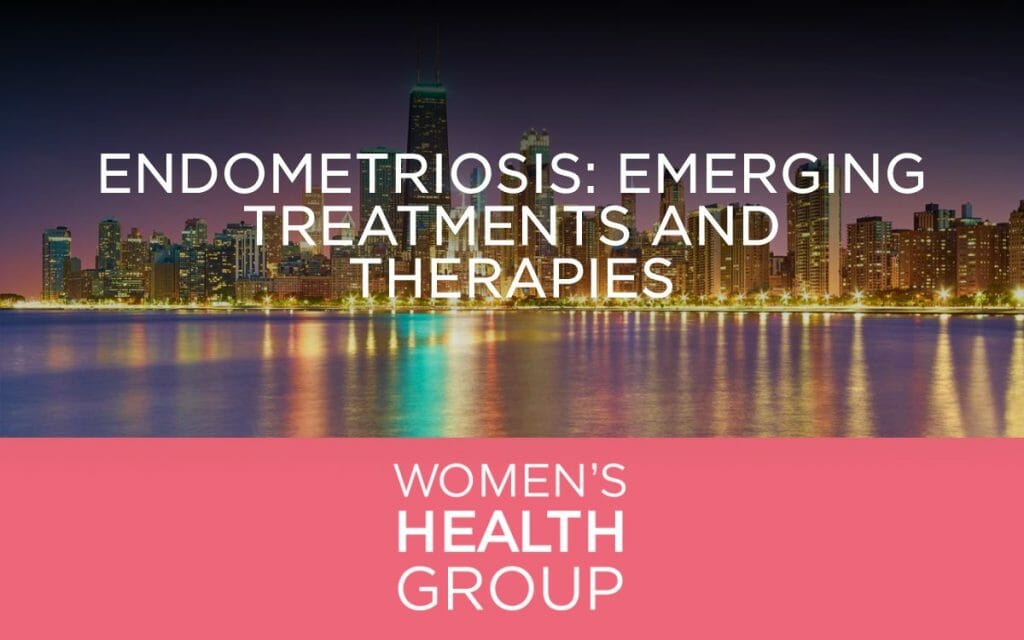Understanding Endometriosis
Endometriosis is a chronic condition that affects an estimated 10-15% of all women during their reproductive years. It occurs when tissue, similar to the one lining the uterus (the endometrium), starts to grow in areas outside the uterus, such as the ovaries, fallopian tubes, and the pelvic lining.
This misplaced tissue responds to menstrual cycle hormones in much the same way the endometrium does: it thickens, breaks down and bleeds. But because this tissue has no way to leave the body, it becomes trapped, leading to pain, inflammation, fertility issues, and the formation of scar tissue.
At Women’s Health Group in Chicago, Illinois, our obstetrician-gynecologists have expertise in diagnosing and managing endometriosis. We are aware of the health and quality-of-life consequences this condition can have, and as such, we’re dedicated to providing up-to-date information on emerging treatments and therapies for endometriosis.
Challenges With Current Treatments
The main challenge with treating endometriosis lies in its complexity. The disease involves multiple systems within the body and can have different symptoms and degrees of severity in each woman.
Currently, a common clinical approach includes surgical techniques to remove the misplaced tissue and hormonal medications to suppress the growth of endometriotic lesions. Despite their effectiveness, however, these methods have limitations. For instance, surgery might not be able to remove all the endometriotic tissue, and hormonal treatments often have unwanted side effects or only provide temporary relief.
Emerging Therapies
With such complexity and variety of presentations, it’s clear that there is a profound need for more effective, less invasive, and personalized treatments for endometriosis. Here, we’ll introduce exciting therapies emerging in scientific research and clinical trials that promise hope to those living with this condition.
Immunological Therapies
Research has shown that women with endometriosis have different immune responses compared to those who do not have the disease. These discoveries have led to studies exploring immunological therapies that target the immune response, seeking to normalize it, and thereby reduce inflammation and pain.
These therapies might include the use of monoclonal antibodies, chemicals designed to bind specific cells or proteins and influence the immune response, or therapies utilizing one’s immune cells, such as dendritic cell therapy.
Targeted Hormone Therapies
Hormonal therapies aim to suppress the hormonal activity fueling the growth of endometriotic tissue. Some of the newly researched hormone therapies seek to have a more targeted action, reducing the unwanted side effects associated with traditional hormone treatments.
For example, selective progesterone receptor modulators (SPRMs) work by binding to progesterone receptors, which are involved in the growth of endometriotic tissue. By binding to these receptors, SPRMs can hinder the tissue’s growth without other hormonal side effects.
Stem Cell Therapies
Stem cell therapies represent a new frontier in endometriosis treatment. The idea is that stem cells could be used to repair or replace the endometrium, thereby providing a potential cure for endometriosis.
This treatment is still in the experimental stages, with most work being done in animal models. However, the possibilities are intriguing, giving hope for a future where endometriosis could be treated effectively and without the need for invasive procedures or life-long hormonal treatments.
Utilizing A Holistic Approach
Apart from these promising treatments, it’s equally essential to focus on a holistic approach for managing endometriosis. This includes lifestyle interventions, such as maintaining a balanced diet, regular exercise, stress management, and ensuring adequate sleep.
Moreover, as the condition has emotional and psychological implications, counseling, and access to supportive communities can go a long way in dealing with endometriosis.
The Future Of Endometriosis Treatment
While there are significant advancements in endometriosis therapies, it’s essential to remember that every woman’s experience with this disease is unique. Selecting the most appropriate treatment is a collaborative effort between the patient and the healthcare professional and highly depends on individual symptoms, disease progression, and the patient’s goals (such as symptom relief or preserving fertility).
It’s an exciting time, with promising therapies on the horizon. These changes provide hope that we are moving closer to not just managing, but potentially curing endometriosis in the future.
For more information, consult the Mayo Clinic’s resources on endometriosis therapies and the guide available at the Office on Women’s Health.
Navigating The Journey With Endometriosis
Endometriosis is a condition that can profoundly affect a woman’s life. But with early diagnosis, regular medical care, and the emerging therapies we’ve highlighted, it is a manageable condition.
At Women’s Health Group, Chicago, we’re committed to supporting you on this journey, offering comprehensive care, and providing the latest evidence-based treatments for endometriosis. With knowledge and the right support, you can navigate this journey successfully and limit the impact of endometriosis on your quality of life.




